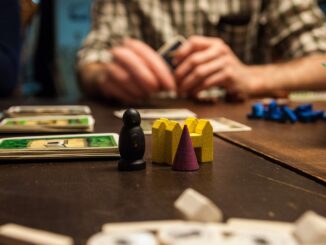
Whether you want to join in with your kids who are learning, rock out with some other old fellas or just play solo for some relaxation, it can seem daunting to begin this journey later in life.
There’s a quiet kind of courage in starting something new as an adult. It defies the comfort of routine, challenges the myth that “it’s too late,” and opens the door to creativity many of us thought we’d left behind. Learning a musical instrument is one of the most rewarding and accessible ways to rediscover this creative spark — and adults are more equipped for it than they often realise.
The Adult Advantage
Whilst you may think of musical mastery as a young person’s game — prodigies in piano competitions or teenage guitarists shredding solos — adults come to music with distinct strengths that often lead to deeper and more satisfying engagement.
First, there’s intrinsic motivation. Unlike children who may be signed up for lessons by well-meaning parents, adults learn music because they want to. That difference matters. When learning becomes a choice rather than a chore, the process becomes more enjoyable and more meaningful.
Adults also bring emotional depth and life experience to music. Whether you’re playing a melancholic blues riff, a soaring pop melody, or a delicate classical piece, your years of lived experience give the notes weight and feeling. Music is about connection, and adults are wired for it.
Lastly, let’s not forget discipline and perspective. Adults understand the value of consistent effort. They’re better at setting realistic goals, managing time, and pushing through frustration — all essential skills when learning a new instrument.
Choosing the Right Instrument
The best instrument to learn is the one that excites you. Still, some instruments tend to be more beginner-friendly and accessible than others:
- Piano or Keyboard: A popular choice for its visual layout, versatility, and range. It’s ideal for those who enjoy structure, and digital versions are space-saving and affordable.
- Guitar: A staple of pop, rock, blues, and folk, the guitar is portable, expressive, and well-supported by countless online tutorials. Expect sore fingers at first — it’s a rite of passage.
- Ukulele: With soft nylon strings, simple chords, and a cheerful tone, the ukulele is often recommended as the most accessible stringed instrument for beginners.
- Digital Drums: If rhythm is your calling, electronic drum kits offer a space-friendly and quieter entry into percussion.
- Voice: Your voice is an instrument too. With some coaching and practice, anyone can improve their singing, and it requires no gear at all.
Whatever you choose, make sure it aligns with your lifestyle, budget, and musical taste. The best way to stay motivated is to love the sound you’re creating.
Common Challenges – and How to Beat Them
Learning music as an adult isn’t without its hurdles. But each challenge has a workaround — or even an unexpected benefit.
1. Limited Time
Adults juggle work, family, and other responsibilities. Instead of hour-long practice sessions, aim for 10–20 minutes of focused, distraction-free playing. Daily micro-practice builds real skill over time.
2. Impatience and Perfectionism
Adults often expect quick progress — and can become discouraged when it doesn’t happen. But learning music is a slow and organic process. Celebrate small victories. That first clean chord or fluid scale is a win worth recognising.
3. Fear of Failure
Trying something new in adulthood can feel vulnerable. What if you’re no good? What will people think? The truth is, most people admire someone brave enough to start. Let go of the need to impress. Focus on the joy of learning.
4. Physical Limitations
Dexterity, flexibility, and stamina might not be what they once were — but that doesn’t mean you can’t play. Choose ergonomic instruments, warm up your hands, and work within your physical comfort zone.
Learning Tools for the Modern Adult
Thanks to technology, adults have more tools than ever to learn music independently or with guidance:
- Apps like Simply Piano, Yousician, and Fender Play provide interactive lessons with real-time feedback.
- YouTube offers thousands of tutorials for every instrument and genre, though it can be overwhelming without a structured path.
- Private teachers, in person or online, offer personalised feedback and structured progression. Even one lesson a month can make a big difference.
- Books and method guides give focused, theory-backed instruction — especially good for piano, guitar, and voice.
Mix and match these tools based on your learning style. Some people thrive with a set curriculum; others prefer exploring songs they love.
The Unexpected Benefits of Musical Practice
Learning music as an adult isn’t just about playing songs. It can change the way you think and feel in daily life.
- Mental sharpness: Music activates multiple areas of the brain, improving memory, coordination, and focus.
- Stress relief: Playing music is a form of mindfulness. It demands attention and rewards presence, easing anxiety and tension.
- Confidence: Achieving something new — especially something you thought might be “too late” — builds real self-esteem.
- Creativity: Whether you’re writing songs, improvising, or simply choosing what to play, music reconnects you with your creative self.
- Community: From online forums to local jam nights, music opens up new friendships and social opportunities.
Tips for Staying the Course
- Set achievable goals: “Learn one song,” “Practice three times this week,” or “Record myself playing” are all great motivators.
- Keep it fun: Don’t just drill exercises. Play songs you love — even simplified versions.
- Record your progress: Looking back at where you started is a great reminder of how far you’ve come.
- Don’t compare: You’re not competing with 12-year-old prodigies. You’re building your own path.
- Play for yourself: Music isn’t about perfection. It’s about connection — to yourself, to others, and to the moment.
Music Is a Lifelong Companion
Learning a musical instrument as an adult isn’t about becoming a concert performer or impressing others. It’s about tapping into something timeless and universal. It’s about reclaiming curiosity, exercising patience, and enjoying the process of growth.
So whether you’re 35, 55, or 75 — it’s not too late. In fact, this might be the perfect time.
Pick up that instrument. Make some noise. It won’t be perfect. It won’t be fast. But it will be yours — and that’s more than enough. Remember, it’s never too late to start. Plus, you might just be a late blooming rock god.



